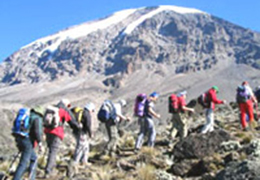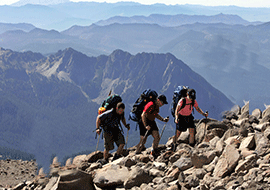Mountain climbing is an extremely popular sport or adventure in Africa. Whether it’s a single day hiking on one of the smaller African mountains or it’s the mighty Mount Kilimanjaro you intend to climb or one day trekking Bwindi forest; the experience is exhilarating. Check out some of our mountain climbing packages below or Contact any of our holiday experts to plan your mountain climbing holiday today.

Africa offers so much to holiday travelers, one of this attractions is Mountain Climbing. There are several mountains in Africa, most popular once are Mount Kilimanjaro and Mount Kenya; both this mountains have a snow-capped peaks and are the first and second highest mountains in Africa.
Mt. Kilimanjaro is not only Africa's highest mountain but also the highest 'Free-standing' mountain in the world, with a height of about 5,895 m. Mount Kenya is the highest mountain in Kenya and the second highest in Africa, its located across the equator with height of 5,199 m. other top mountains in Africa include Mount Stanley in DR Congo, Mount Speke in Uganda, Mount Baker in Uganda, Semien mountains in Ethiopia, Mount Elgon on the Kenyan-Uganda boarder, the Atlas Mountains, The Drakensberg, Jabel Marra, Mount Meru and Mount Oku.
Mountain climbing is exciting and full of lifetime experience. However, one needs proper preparation and the right climbing gear; else it can be very dangerous especially if you are planning to get to the peak.
Once you decide on your Mountain climbing trip in Africa, then you need to start the preparation, you need at least three months training prior to the climbing trip. For those who can afford, the best is to join a mountain climbing school; where you learn the basic climbing skills, how to use the equipment and safety precautions. Else you can just enroll in a fitness center and concentrate on activities such as jogging, squatting, sit-ups, cycling, aerobic and swimming to strengthen your legs, running power and enhance your breathing system.
Most of the mountains are considered to have straight forward routes and require minimum climbing gear, unless if you want to try different routes with more adventure and rock climbing experience, then you will require the full climbing gear. Around most of these mountains, there are a few local mountain climbing clubs and hotels with well experienced mountain climbing guides and potters for hire, to guide and assist you on your trip.
January to early March and July through to September are the most popular months for mountain climbing in Africa, In these periods, most African countries are said to be warm and dry, making it an ideal time to climb.
Most people who are not accustomed to mountain climbing get mild altitude sickness; it can get fatal if not treated immediately. Altitude sickness is caused by the body not adapting fast enough to the reduced level of oxygen in the air due to the high altitude, the main symptoms are headache, nausea, decreased appetite, a stinging feeling in the toes and fingers and a slight swelling of ankles and fingers.
The mild altitude sickness is not serious and it usually disappears within 48 hours, but it is good to inform the guides who can assess you and give you the appropriate advice. Most of the guides are well trained and can tell how serious is the sickness and what is the best action to take. It is also advised to walk in a group so that it can be easy to detect if a member is unwell. The best treatment for severe altitude sickness is to descent.
Our best advice is you visit your personal doctor or a traveling clinic, for the necessary vaccination. Make the appointments on time, because some vaccinations are taken in intervals and require some time.
Please note that you require an entry Visa in most African countries, contact the local embassy or consulate of the country you intend to visit for the full information.

Whether its your lifetime dream you want to fulfill by climbing Mount Kenya or you are after a one day hiking adventure at Mount Longonot; mountaineering is an exhilarating sport to

Whether its your lifetime dream you want to fulfill by climbing Mount Kilimanjaro or you are after a one day hiking adventure at Mount Meru; mountaineering is an exhilarating sport to always enjoy. Check out our

After having the basic training, then comes the time to think about what to carry and the climbing gear; if you are intending to just climb once and don’t wish to do it again, economically it is wise to just hire the items locally, most of the mountain's head office rent out the climbing gear at a reasonable cost. Mountain climbing in Africa does not require very sophisticated equipments, just the basic once.
The packing mostly depends on the number of days to spend, but normally it is good to carry enough warm cloths especially the socks, try wrapping them in plastic bags to avoid getting wet, also avoid to wear cotton directly to your skin because it absorbs sweat and can reduce your body temperature, try have jackets with synthetic and polyester insulates, they protect you from the strong wind and getting wet.
A proper packing would include cloths that are windproof and waterproof, thermal underwear, good gloves, a cap, a balaclava (ski mask, to shield the face against strong wind), shorts, jersey, T-shirts, good mountain climbing shoes/boats with extra laces, light and watertight mountain shoes (type B), sweaters, rain-wear (poncho, suit or cape), long sleeve T-shirts / blouses (to protect you from the sun), sun glasses, warm sleeping bag and a quick dry towel.
Other important items would include small backpack with a rain cover for you to carry on the day trips, a large backpack that the porter will carry (up to 15 kilograms, the porters prefer duffel bags), a 2L water bag, a 2L thermos bottle use when it’s cold freezing, a pocket knife, sun cream, lip balm, head light or flashlight with reserve batteries, a luggage cover, binoculars, camera with reserve batteries, traveling clock with alarm, a writing or reading book and a few games.
Medication and treatments would include ointment to treat bruises and muscles, paracetamol, betadine cream, sport tape (hand wide), second skin to treat blisters, wet wipes, antibacterial and disinfecting hand gel and mosquito repellent.
It is always good to have some tips on how to make your mountain climbing trip successful. One of these tips is to be in a group; it reduces the cost and in case of anything there are people around you for help.
Great mountain climbing in Africa comes as a result of good planning, once you have identified the mountain to climb, you carefully need to find a good tour operator/guide who has great knowledge about the mountains you itend to climb. A good guide knows the best route that allow proper acclimatization, the route with the best views and with the best chances to reach the summit. So be very selective on the tour operators and don’t be too cheap.
The other tip is get fit before your mountain climbing trip; if you want to reach the summit one of the major preparations is being fit. Also is good to have a basic medical check up and try to get a travel insurance that includes medical.
Dealing with the high altitude is another challenge, the best advice is don’t hurry, allow enough days to acclimatize, drink lots of water about 4-5 liters of water, take some medication to prevent altitude sickness, use the Walk high and sleep low technique, Also make sure your guides are carrying the proper medical equipment such as oxygen, radios and a re-compression bag to deal with altitude sickness if it arises.
Pack well; make sure you have all you need to deal with the high altitude and temperatures variation, Don't worry about carrying it, the porters are well trained and can take up to 30lbs (15kg) of weight in a duffel bag to the peak of the mountain. For the equipment, if you dont want to buy, you can rent them locally.
Early planning and book in advance, this will allow you to get an opportunity to climb on the high season (January-March and September-October), it’s the best time to climb when the weather conditions is dry.